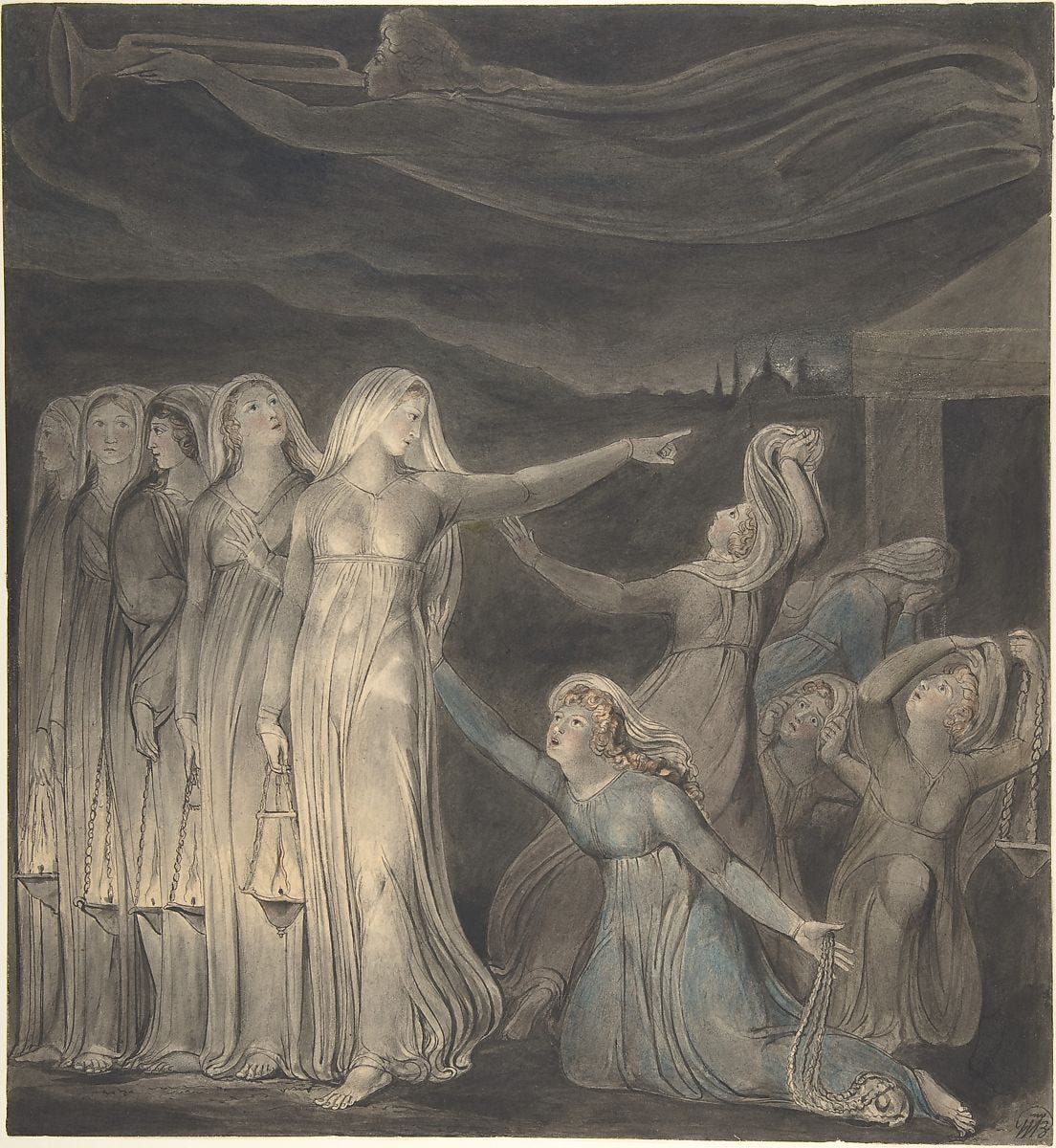Dear reader,
Over the past few weeks of Advent, the parable of the ten virgins has been on my mind. In the parable, ten virgins go out to meet the bridegroom, each carrying lamps, but only five taking extra oil with them. “The bridegroom was a long time in coming,” Jesus tells us, and the virgins fall asleep, only to be woken at midnight with the cry that the bridegroom is coming. The five without extra oil do not have enough to light their lamps, and they must go out to buy more. But when they return, it is too late; the door is shut, not to be opened.
With this ending, it’s a sober parable, and one fitting for Advent. Beyond waiting for the day we remember Christ’s incarnation, Advent’s traditional focus is on Christ’s second coming. Advent calls us to wake up, to watch and wait.
Staying awake is not easy. Jacques Maritain observed that “the Christian is apt to take for his pillow the very love which he has received.” These words pierce. In our sinful weakness, we cling to ease and self-satisfaction. We easily take the love that has been given to us in Christ and use its comfort to shut our eyes to the suffering around us and to our own besetting sins. Taking God’s love as a pillow, we close our eyes and ears to the darkness within and without.
This warning also appears in the beginning of Dante’s Purgatorio. Emerging from Hell and its dark, dank, oppressive atmosphere, Dante the pilgrim is overjoyed to leave behind Hell's deadly gloom and instead embrace the “beauteous planet which incites to love” which “was causing all the easter sky to laugh.” But his journey is not yet complete: he now must ascend Mount Purgatory and so be cleansed from his sins.
At the base of the mountain, Dante meets a boat load of newly-dead souls. One of them, Casella the musician, knows Dante. To Dante’s delight, Casella sings one of Dante’s songs. Dante says that he and all those who listened “seemed as contented, as if none of us /had any other thing upon his mind. / Absorbed in listening to his notes, we all / were motionless.” But their contentment is interrupted by a rebuke: “Ye laggard spirits, what is this? / What means this negligence and standing still? / Run to the Mount, and strip ye off the slough, / which lets not God be visible to you.” Dante’s temptation to sloth is my own—a temptation to take God’s love for a pillow, rather than the fuel for a hungering and thirsting after righteousness that compels the believer onward and upwards.
Dante and the virgins offer a warning, a reminder that the redemption we have received is not license for idleness. Like Dante the pilgrim, we must press on in our sanctification, fixing our eyes upon the goal of our salvation. Then, like the five wise virgins, we will not be caught unaware when the bridegroom returns.
Fleming Rutlege, in her collection of Advent writings and sermons, observes that the virgins wait together for the bridegroom. She takes this to communicate the corporate nature of our waiting. We do not wait alone, you and I. Instead, we wait alongside each other. Dante understands this—Dante the pilgrim does not journey alone. First Virgil and then Beatrice remain at his side. In our waiting, our ascent, we need others.
As the night grows longer and the bridegroom delays, we need one another to encourage us onward, to rekindle hope where it threatens to be extinguished, to remind each one another that though he tarries, yet he is surely coming.
William Blake / The Parable of the Wise and Foolish Virgins / ca. 1799–1800 / Watercolor, pen and black ink, brush and wash, over graphite
Blake’s depiction of the parable is fittingly somber and ethereal, with the dark tones throughout contrasted with the illuminated wise virgins. The figure noticeably absent from Blake’s portrayal is the Bridegroom himself; here the focus is on the bewilderment of the foolish virgins. I wonder about the resoluteness with which the wise virgins turn the foolish virgins away to seek more oil elsewhere. They must know, more than I, the finality of that hour.
Advent Calendar
By Rowan Williams
He will come like last leaf’s fall.
One night when the November wind
has flayed the trees to the bone, and earth
wakes choking on the mould,
the soft shroud’s folding.
He will come like frost.
One morning when the shrinking earth
opens on mist, to find itself
arrested in the net
of alien, sword-set beauty.
He will come like dark.
One evening when the bursting red
December sun draws up the sheet
and penny-masks its eye to yield
the star-snowed fields of sky.
He will come, will come,
will come like crying in the night,
like blood, like breaking,
as the earth writhes to toss him free.
He will come like child.
Almighty God,
fulfill our desire
and kindle our hearts by your Spirit,
that being filled with the oil of your grace,
we may shine as bright lights
at the coming of your Son Jesus Christ;
who lives and reigns
with you and the Holy Spirit,
one God, now and forever.
from the Gelasian Sacramentary
On the road with you,
Laura




